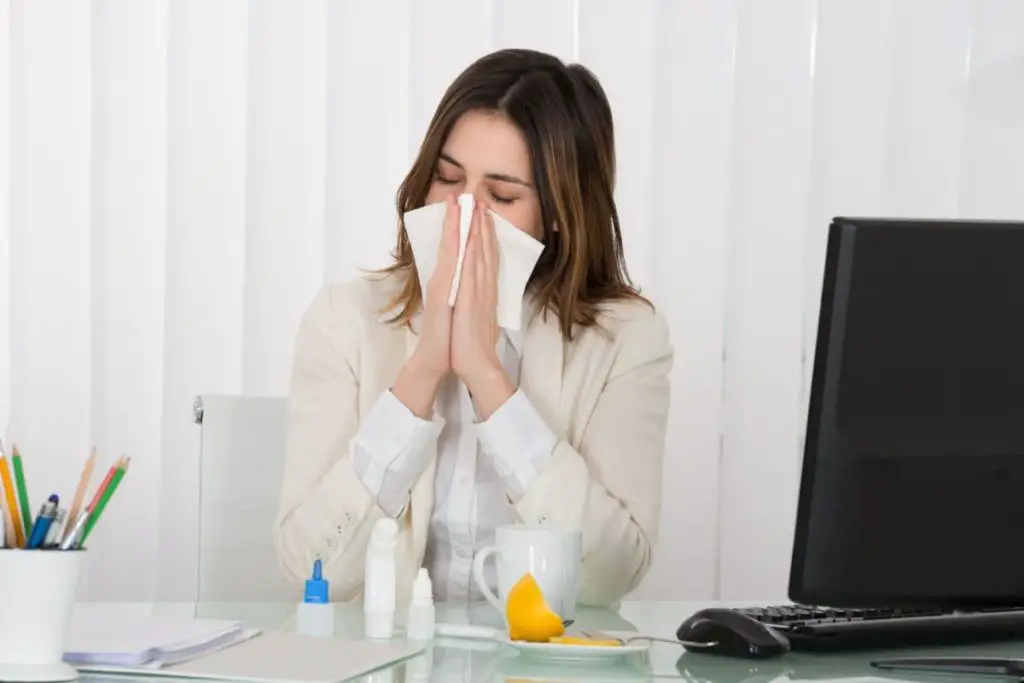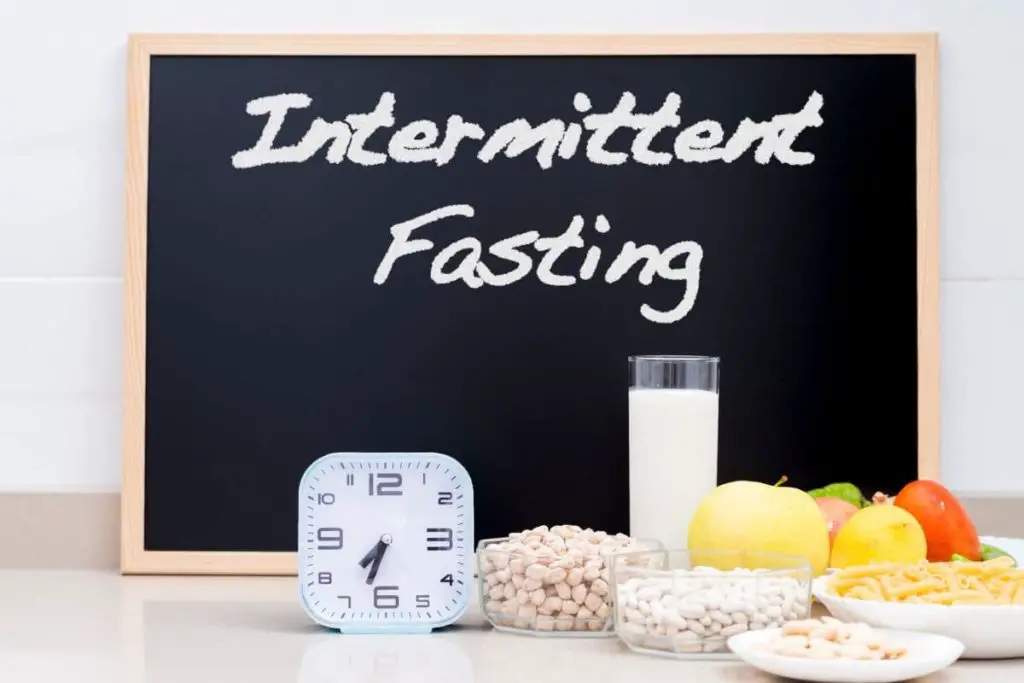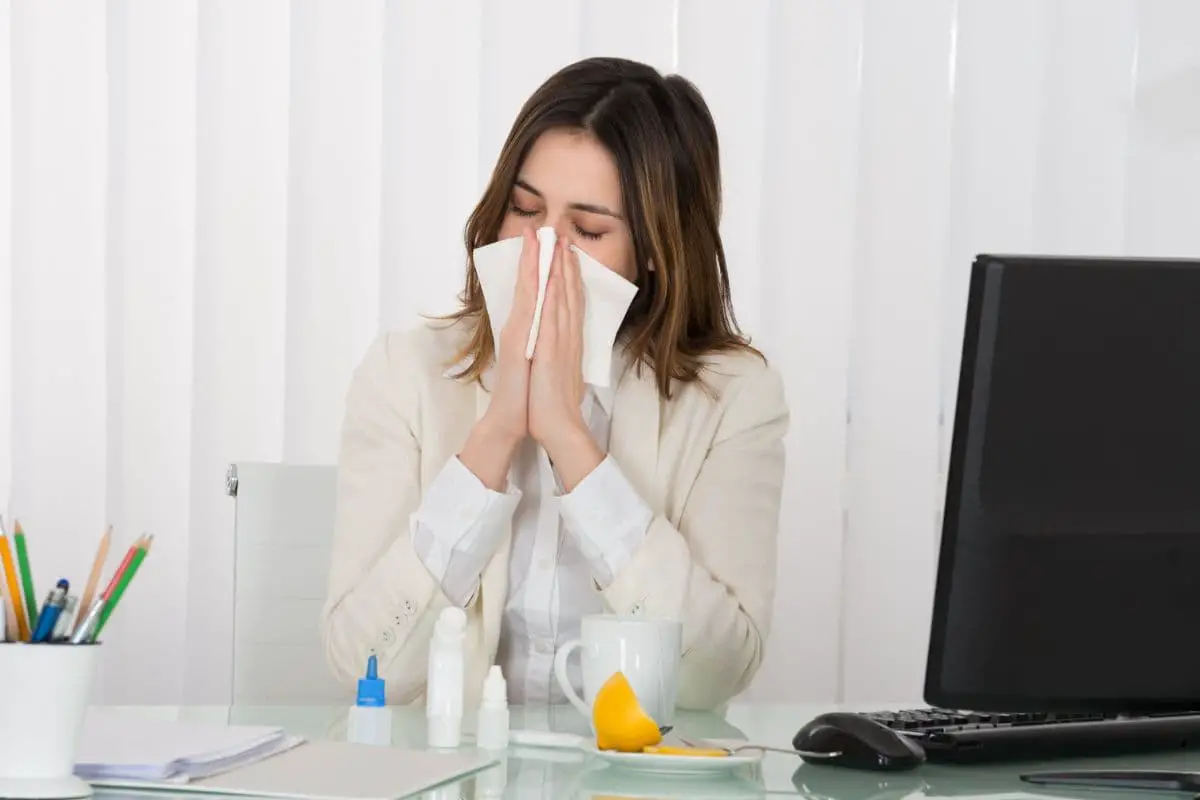You’re doing all you can to be healthy, including using intermittent fasting for the health benefits. But when you get a cold, it can be difficult to know if you should keep to your routine or put your fasting routine on hold until you feel better.
It’s not bad to fast when you have a cold. Fasting can help you feel better sooner than if you didn’t fast when you have a cold. Fasting allows your body to repair itself and remove all the cell waste since it doesn’t have to digest food.
Having a cold at any time of the year is the pits, but that doesn’t mean you need to stop fasting when you’re sick. This article will explain why it’s better to fast when you have a cold, how to fast properly, and what you might need to take to help you feel better. Stick around!

How Fasting Helps a Cold
Not having an appetite when you’re sick is normal, and it’s your body’s way of dealing with the illness. While most people worry about eating while being sick, this might hinder your recovery time, especially if you have a bacterial infection.
However, eating when you have a viral infection can help your recovery. But you don’t want to eat much food while you’re sick, as this can go the other direction.
If this sounds confusing, let’s see if we can help clear it up.
How Autophagy Can Help Your Immune System
Autophagy is a fancy word for the maintenance work your cells do when you’re fasting or sleeping. When you fast, and there is nothing for your body to digest anymore, your body has time to clear out all the waste your cells make.
This waste might consist of:
- Damaged mitochondria
- Dead cells
- Malformed cells
- Diseased cells
- Toxins that cause illness
- Free radicals
If your body is constantly working to digest the food you eat, it doesn’t have time to clear out all the cellular waste that can lower your immune system. Fasting at least 12-14 hours daily can help mitigate the damage your immune system suffers, and part of that time is spent sleeping.

Viral Infections vs. Bacterial Infections
There is a difference between viral and bacterial infections regarding fasting, however. A study done with mice showed that when mice fasted with a viral infection, they died. But when they fasted with a bacterial infection, they survived and recovered quicker.
The conclusions were that the type of infection determines whether we should fast or not.
Viral infections act like a conquering country bent on world domination. Once a virus gets in your body, it jumps on the cells, takes over, and starts reproducing more viral cells. The only way to stop this is by eating normally. Of course, you want to eat healthier meals than you might otherwise eat.
Bacterial infections start with a single-celled organism that decides to grow and create an entire colony. Fortunately, our immune systems tend to keep most of the bacteria we encounter at bay before it has a chance to grow.
However, if you have a bacterial infection and eat more often, it can worsen your immune system, as it doesn’t allow your body to remove the diseased cellular waste.
Do You Have a Viral or Bacterial Infection?
The only way you’re going to know if your cold is a viral or bacterial infection is to go to your doctor for a test. However, if your illness doesn’t seem to go away after a couple of weeks, it might be a bacterial infection.
Viral infections tend to clear up in a week or two, especially if you’re taking care of yourself during this time. Bacterial infections tend to hang on and get worse.
In this case, the best course of action is to see your doctor to make sure one way or the other.
Be Sure To Keep Hydrated
Fasting during a cold can help you recover, especially if it’s a bacterial infection. However, you still need to keep hydrated. Dehydration, when you’re sick, can cause your symptoms to get worse. Your sinuses will plug up, and you won’t be able to expel the waste from your body as easily.

Drinking plenty of fluids while sick can also help you keep bacteria at bay, as it flushes out your system.
What To Drink When You Have a Cold
Not all liquids are equal, and what you drink when you’re sick determines how quickly you recover. That being said, you’ll want to stay away from sugar-laden drinks, as an excess amount of sugar can make your symptoms worse.
Here’s what you should drink while sick:
- Water
- Herbal, green, and black tea
- Black coffee with a bit of cream, half-and-half, or whatever creamer you like.
- Stevia-sweetened drinks
- Smoothies without sugar
Try to stick to water most of the time, as that will flush out your system much better without adding other ingredients or calories.
Use Intermittent Fasting To Get Needed Nutrients
Regardless of whether you have a bacterial or viral infection, you’ll still need to eat something at least once a day to get the nutrients you need to recover faster. While you don’t want to eat a lot of food, especially when you’re sick, you want to stick to proteins and lower-carb vegetables and fruits for the vitamins and minerals.
But you also want to fast for at least part of the day to give your body a chance to recover and rejuvenate itself, as we discussed earlier. This is where intermittent fasting comes in. If you’re unfamiliar with intermittent fasting, it’s basically going for longer periods without eating.
Let’s see the different protocols and how they can work for you while you have a cold.
Sample Intermittent Fasting Protocols
The most basic intermittent fasting protocol is 12:12, meaning you have a fasting window of 12 hours and an eating window of 12 hours. Our ancestors used this traditional eating pattern before food became more abundant.
They would get up and have breakfast by 6 AM, go to work, eat lunch at noon, then have supper by 6 PM. Then they would sleep for 8 hours, get up, and repeat the process.
The next protocol is the 14:10, where you fast for 14 hours and eat your meals within 10 hours. An example of this might be:
- Breakfast at 8 AM
- Lunch at 1 PM
- Supper at 6 PM
The most common fasting protocol is 16:8, which is the easiest to follow, and it gives you more health benefits of fasting. You would eat your meals within an 8-hour window and fast for 16 hours.

This is a popular protocol because you can sleep for 8 hours and then fast 4 hours after you get up and four hours before you go to bed.
Here are the other fasting protocols that you can use:
- 18:6
- 20:4
- One meal a day (OMAD)
- 5:2, which means you would eat normally for 5 days of the week, then eat only 500 calories for 2 days.
For viral infections, you’ll want to have at least two meals daily to recover quickly. But if you have a bacterial infection, you’ll want to consider the longer fasting periods. Of course, it’s completely up to you, as you know your body best.
Choose Your Foods Wisely
Whether you’re fasting or not, you’ll need to choose your foods wisely to get the best nutrition possible to fight off your infection.
For example, if you’re doing a 20:4 fasting protocol, then you might want to choose plain yogurt and berries for your first meal. For your second meal, you may want a high-quality protein with steamed vegetables.
The point here is that you want to choose foods that are nutritious and lower in carbohydrates so that your body has fuel and building blocks to help you fight the infection.
Don’t Try Fasting For a Cold If You’re Not Fat-Adapted
If your body is not fat-adapted, you might not want to try fasting when you have a cold. What do I mean by “fat-adapted?” Think of your body as a horse-drawn carriage that has suddenly been transformed into a horseless carriage, i.e., a car.
Your body is used to eating carb-heavy foods, which turn into glucose during the digestive process. Because of the constant influx of glucose in your body, it gets used to using glucose as fuel. But when you deprive your body of glucose, it doesn’t know what to do for a couple of days.
Have you ever heard of the “keto flu?” That’s when you start eating low-carb foods, and your body starts using fat as fuel instead of glucose.
The symptoms can range from mild aches to nausea, headaches, and fatigue. You get aches all over your body, and you just can’t seem to get moving. While there are things you can do to mitigate these symptoms, you just need to ride them out until your body is adapted to using your fat stores for fuel instead of glucose.
When you have a cold, you already feel miserable, right? If you’ve never fasted before, or you’ve never gone on a low-carb or keto diet, your body is not fat-adapted, as it’s still using glucose as its fuel source.
Fasting while you have a cold at this point will only make you feel worse, so you might not want to try this until after you feel better.
Vitamins and Supplements Can Help Recovery Speed Up
While you can get most of your vitamins through your food, there are some that you’ll need to get much more of while you’re sick because they can boost your immune system a lot better than if you didn’t have them at all.

Some of these might include:
- Vitamin C
- Vitamin D3
- Zinc
- Elderberry
- Turmeric
- Ginger root
Officially, the verdict is out about whether or not vitamins and supplements actually help speed up your recovery. However, when I’m sick and take these, I feel much better on the second or third day after getting sick, and I’m not sick as long as I otherwise would be.
If you want to try taking extra vitamins and supplements, let’s discuss them in more detail.
Try the Mainstream Vitamins First
Chances are, if you have a cold, your immune system isn’t at its best, and you’re not getting the minimum amount of vitamins and minerals. You can try getting all the vitamins you need from the food you eat, but that’s not going to be enough.
Vitamins boost your immune system to have what it needs to fight off your infection. Here’s a list of the minimal vitamins and minerals you need to fight off your cold:
- Vitamin C
- Vitamin D3
- Echinacea
- Zinc
- Elderberry
When you do eat, you might want to add garlic and onions to your food, such as soup, in liberal amounts, as they fight viral infections very well.
Alternative Supplements To Try
There are other supplements that I use that I swear by, including Turmeric and Ginger root capsules. These supplements fight inflammation that’s brought on my viral and bacterial infections. They also work to boost your immune system so that your body has extra tools to fight off your cold.
While these are not considered cold-fighting supplements in the mainstream medical community, they work quite well based on my experience and others’ experiences.
When To Seek Medical Attention
Fasting, healthy food, and supplements might not always help you recover from a cold. A cold that lingers longer than a couple of weeks and worsens over time should be considered serious. Seek medical attention if:
- Your fever doesn’t go down or if it goes up.
- You have trouble breathing.
- You experience pains not normally associated with a cold.
- Any other symptoms that don’t seem normal.
Seeking medical attention is even more critical now that Covid is here to stay. Several cold symptoms might indicate Covid, so you’ll want to monitor your symptoms and get help if needed.
Conclusion
Fasting when you have a cold isn’t bad, and in fact, it can be beneficial if you practice intermittent fasting and eat on a schedule. Get plenty of rest, stay hydrated, eat healthy food when you eat and take a good multivitamin.

